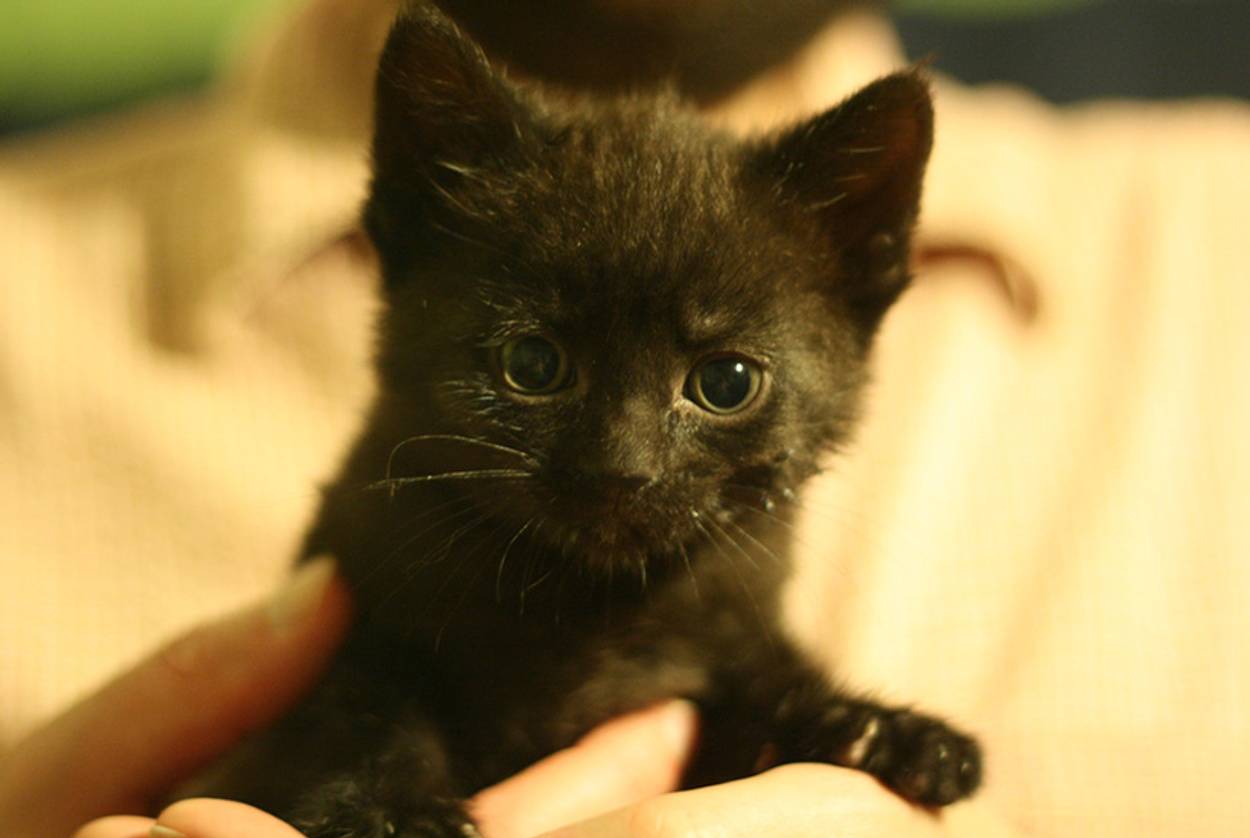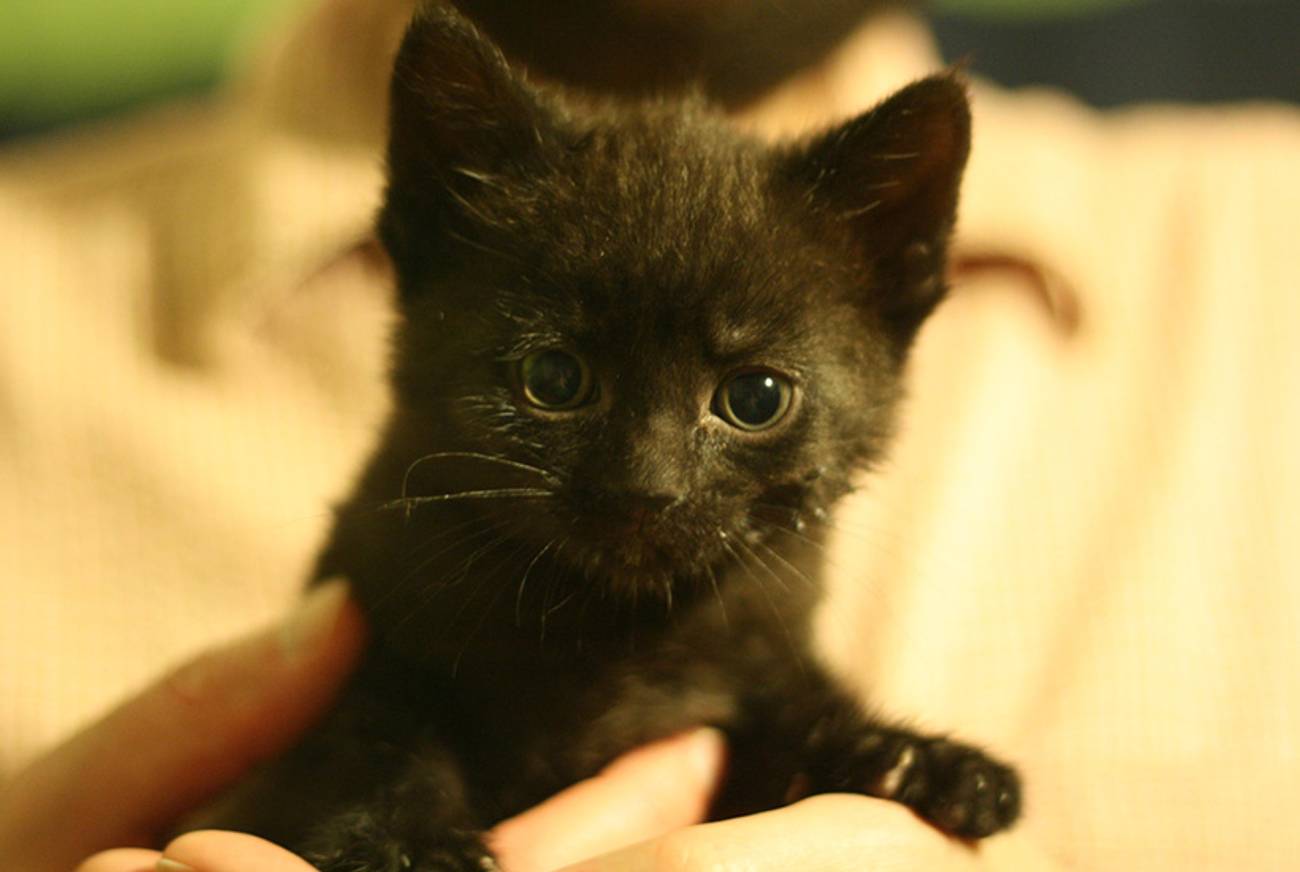A Farewell to Slinky, Our Beloved Cat Who Was Named by Tablet Readers
Judaism teaches us to be kind to animals. We teach that lesson to our kids by caring for our pets and mourning their loss as a family.




My cat Slinky Sivivona Steuer died two weeks ago. She was only 3. Tablet readers helped name her. She got sick very quickly and died, and we don’t know why.
She was a wonderful cat. She was a crazy, playful kitten, running around the house like a maniac, attacking the children’s toes under the covers. When she finally settled down to rest, she loved to sleep at the foot of Maxie’s bed. Jonathan’s and my bed was our older cat Yoyo’s prized place, and Slinky knew who the boss was. But toward the end of her life she braved our bed, letting Yoyo choose a space first, then lying down nearby. In the last two weeks of her life, she slept on my chest.
Slinky was a mighty huntress. We live on the ground floor of an old tenement building, with ample shudder-inducing urban wildlife. Our first cat, Sebastian, was no help. He once pranced around with a leaf hanging out of his mouth for an hour, proudly thinking he’d killed it. He died when Josie was 3. We got Yoyo 18 months later; when we brought her home, she killed two mice in two days as if to say, “There’s a new sheriff in town!” But that was the end of her hunting career—she immediately became a klutzy, nuzzly, chubby, purring lap cat. She falls off chairs. She’s so eager to be with the family she constantly risks scolding by jumping onto the kitchen counter. Once she landed in my birthday cake. Several times she’s lit her fur on fire by vaulting directly into the Shabbat candles. Slinky, on the other hand, was always as quiet and lethal as her name. She killed flies, bugs, mice. Once she went out into our walled yard and caught a small bird. She brought it inside as it flapped madly in her mouth, shedding feathers everywhere, while the girls and I clutched each other and screamed like stereotypes. Jonathan rescued the bird and brought it back outside. It flew away; Slinky looked at us with outrage.
She was always curious and energetic, but she was affectionate only on her own terms. She loved to lie next to us on her fuzzy, zebra-striped blanket as we watched TV (she would knead it and bury her nose in it ecstatically before settling down), but she never liked being picked up and she was never a lap cat. Yoyo all but shrieks, “Adore me!”—she is the Liza Minnelli of cats—at every person who enters our apartment. Slinky had dignity.
Last week, over the course of two days, Slinky went from lethargic to barely moving. When Josie and I took her to Bideawee on Sunday morning, the vet took blood and immediately said the situation was dire. Slinky’s liver and kidneys weren’t working, and she was in diabetic shock. The vet thought it might be pancreatitis. Saying Slinky needed 24-hour care, she sent us to the Animal Medical Center. By the time we arrived 20 minutes later, Slinky had no measurable blood pressure. We left her there to get IV fluids and antibiotics. When we got home, we called Jonathan’s stepfather Jordy, a veterinarian, and read him the test numbers. “Oh, this is not good,” he said.
The phone rang at 2 a.m. Slinky was still unresponsive. We needed to come in to say goodbye.
I was ready to sneak out without telling the girls. Jonathan was horrified. “We need to give them the choice to come with us,” he said. “She’s their cat, too.” I wasn’t sure I wanted to put them through this, but I opened the door to their room. Two little heads popped up from the bunk bed. They were alert immediately. They both wanted to come. As we left the house, Josie gasped and ran back in. She came back out with the zebra-striped blanket.
The animal hospital was nearly silent. A technician brought us to an empty exam room. Josie spread the blanket on the table. They brought Slinky in. Her eyes were clouded over; her skin was yellow. She was clearly out of it. We petted her and cried. I’d never seen Jonathan sob like this; in times of sorrow, my husband is usually the quiet, grim man of action. (When my dad died, Jonathan updated all my mom’s computers, fixed the wiring, and re-grouted her tile.) “I think Slinky knows we’re here,” Maxie said hopefully. “I think she recognizes our voices,” Josie said hopefully. “She knows the smell and the feel of the blanket,” Jonathan said hopefully.
The vet cried with us. “You’re doing the right thing,” she said, as she brought out a syringe. Maxie looked wild-eyed. “You should leave the room,” I said to the girls. “Josie, comfort your sister.” Josie had her arms around Maxie as they went into the hallway.
“Can I do it?” Jonathan asked. Jordy had let him push the plunger when it was time for Bingo, his beloved childhood dog, to be put to sleep. “Don’t tell anyone,” said the vet. I petted Slinky’s head and whispered to her as Jonathan stopped her heart. I couldn’t tell when she died.
Her collar is still in my purse.
***
Some parents, I know, would be horrified at the choice to wake the kids in the middle of the night on a school night to go visit a dying animal who didn’t recognize them and seemed nothing like the lively creature they knew. But I’m glad Jonathan insisted. “Closure” is a stupid word, and when it comes to death there is no such thing. But the kids needed to feel they’d said goodbye. Slinky had gotten sick so quickly; there had been no time to process. Both girls said they were glad they went, as upsetting as it had been.
When my mom called to express her condolences, Maxie wouldn’t take the phone: “She’s calling about Slinky. I don’t want to talk about Slinky.” But Maxie keeps asking about Sebastian, whom she never met. She likes the stories about him stealing raisins, hunting olives, waking me up with one claw delicately placed on my closed eyelid. “Were you sad when Sebastian died?” she asked. “Very sad,” I told her. “He was my sidekick, when it was just him and me. I had him before you, before Josie, before I even met your daddy.” Maxie thought for a moment and said, “But it’s even sadder when a young kitty dies. Because you never get the chance to get to know her so well.”
Loss is horrible. Loss sucks. Loss is not ennobling. Compared to the loss of a child, the loss of a pet is small potatoes. But it’s horrible.
Judaism has always understood the fragility of life, human and otherwise. Our religion explicitly talks about the need to treat our animals as we would human beings. We’re commanded to feed our pets before we feed ourselves. Most rabbis say we’re allowed to violate Shabbat to rescue an animal in pain. Kindness to animals is named as a prime virtue in the Torah: When Rebecca volunteered to bring water for Abraham’s camels, Abraham knew she’d be a good wife for his son Isaac. And Midrash Shmot Rabbah says that God chose Moses to lead the people after watching him care for animals. “Once a kid ran away, and Moses pursued it until it came to a tree where there chanced to be a pool of water. The kid stood there to drink, and when Moses overtook it he said, ‘I did not know you ran away because you were thirsty. You must also be tired.’ So, he set it upon his shoulder and carried it back. The Holy One said, ‘Since you are merciful to the flock of a human being, you shall be the shepherd of my flock, Israel.’ ”
Today, we’re not supposed to alter our pets for our own purposes. No docking dogs’ ears and tails, no declawing cats. The Torah even prohibits spaying animals (it’s in Leviticus, if you want to check, so the next time someone starts trotting out biblical proclamations about homosexuality, feel free to ask them if they spay their pets). (Yes, I spay my pets. And I love the gays. And I think Torah is a product of its time. Go on, send me hate mail; I just lost my cat.)
The responsibility of caring for our creatures has made my kids more grown-up, less selfish. Seeing Jonathan and me grieve has shown them that we’re people who love and suffer. Letting them mourn Slinky in their own way has shown them there’s no wrong way to experience death. It’s miserable. Even if you’re only grieving a little golden-eyed, long-tailed, mischievous fluffball who never got the chance to be a grown-up cat.
***
Like this article? Sign up for our Daily Digest to get Tablet Magazine’s new content in your inbox each morning.
Marjorie Ingall is a columnist for Tablet Magazine, and author of Mamaleh Knows Best: What Jewish Mothers Do to Raise Successful, Creative, Empathetic, Independent Children.
Marjorie Ingall is a former columnist for Tablet, the author of Mamaleh Knows Best, and a frequent contributor to the New York Times Book Review.